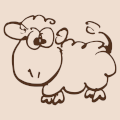Sheep Crossing — 5 of 18
Andrew Geng
Section - Scenery
A thing can be abstract. A thing is usually not abstract.
Before doing anything except examining with an abstract thing (called the target), try examining the target instead.
Before inserting or putting or throwing or showing or giving or tying something to an abstract thing (called the target), try examining the target instead.
The riverbank is a backdrop. The riverbank is everywhere. The description is "Some grass pokes stubbornly through the mud." Understand "bank" as the riverbank. Instead of smelling the riverbank, try smelling the location. Instead of listening to the riverbank, try listening to the location. Instead of examining, searching, or looking under the riverbank, try examining the mud.
The water is a backdrop. The water is everywhere. The description is "Tepid water drifts lazily southward." Understand "river" as the water.
Instead of taking the water, say "You pick up some water but it runs through your fingers."
Instead of drinking the water, say "However high its mineral content, you would rather not drink diluted mud."
Instead of inserting or putting the player on the water, try entering the water.
Instead of entering the water, say "That's not something you can enter without swimming lessons."
Fording is an action applying to one visible thing. Understand "ford [something]" as fording.
Instead of fording something (called the obstacle):
if the obstacle is the water:
end the story saying "Your oxen have drowned, and so have you.";
otherwise:
say "[The noun] isn't something you can ford."
Swimming is an action applying to nothing. Understand "swim" as swimming. Instead of swimming, say "That's not something you can do without swimming lessons."
Instead of searching or looking under the water, say "The water is muddy."
Understand "give [something] to [the water]" as putting it on.
Instead of smelling the water, say "You don't know what that smell is but it seems consistent with the green scum you see floating on the surface."
Instead of listening to the water, say "The gentle sloshing calms your unquiet nerves."
The mud is a backdrop. The mud is everywhere. The description is "You look closely at the mud, but your mind is more focused on questioning the life choices that led you to be examining mud. You shake yourself back to the present and notice some scraggly grass poking through the mud." Instead of taking the mud, say "You would have nothing to wipe your hands on afterward." Instead of searching or looking under the mud, try examining the mud. Instead of smelling the mud, say "It smells like mud." Instead of listening to the mud, say "You hear nothing happening in the mud."
After examining the mud:
now the riverbank is not scenery.
Rule for writing a paragraph about the riverbank:
now the riverbank is mentioned;
say "[the description of the riverbank][paragraph break]".
The ground is a backdrop. The ground is everywhere. Understand "high ground" or "higher ground" as the ground. Instead of examining the ground, try examining the mud. Instead of taking the ground, try taking the mud. Instead of smelling the ground, try smelling the mud. Instead of listening to the ground, try listening to the mud. Instead of searching or looking under the ground, try searching the mud.
The sky is a backdrop. The sky is everywhere. The description is "The sky is clear and the sun is shining." Instead of listening to the sky, say "You hear birds somewhere." Instead of smelling the sky, say "The air smells fairly ordinary for the vicinity of a river." Instead of listening to a room, try listening to the sky. Instead of smelling a room, try smelling the sky. Instead of searching the sky, try examining the sky. Instead of looking under the sky, try looking.
The sun is a backdrop. The sun is everywhere. The description is "You look away quickly. An angry purple splotch throbs in your field of vision." Instead of searching the sun, try examining the sun.
Instead of listening to the sun, say "In space, no one can hear the sun scream."
Instead of smelling the sun, say "That's too far away to smell."
The splotch is an abstract backdrop. A splotch can be purple. A splotch can be faded. The splotch is purple and faded. The description is "It seems to be fading."
After examining the splotch, now the splotch is faded.
After examining the sun, now the splotch is not faded.
After deciding the scope of the player:
if the splotch is not faded, place the splotch in scope.
The swimming lessons are an abstract backdrop. The swimming lessons are everywhere. The description is "You cast your eyes about the landscape but cannot see anything that looks like swimming lessons."
Before taking the swimming lessons:
say "You can't afford swimming lessons. Maybe you can convince Grandmother to pay for them if you bring her enough gifts." instead.
A wolf is in the East bank. The wolf is an abstract scenery animal. The description is "You can't see any such thing. It's just as well, since you do NOT want to bring one of those to Grandmother's house."
Some worms are in the East bank. The worms are an abstract scenery animal. The worms can be exposited. The worms are not exposited. The description is "[if the worms are exposited]Sorry, not that there are actually worms. It's not like the sheep would eat them anyway, though you suppose you could still go searching in the mud.[otherwise]You can't see any such thing.[end if]".
